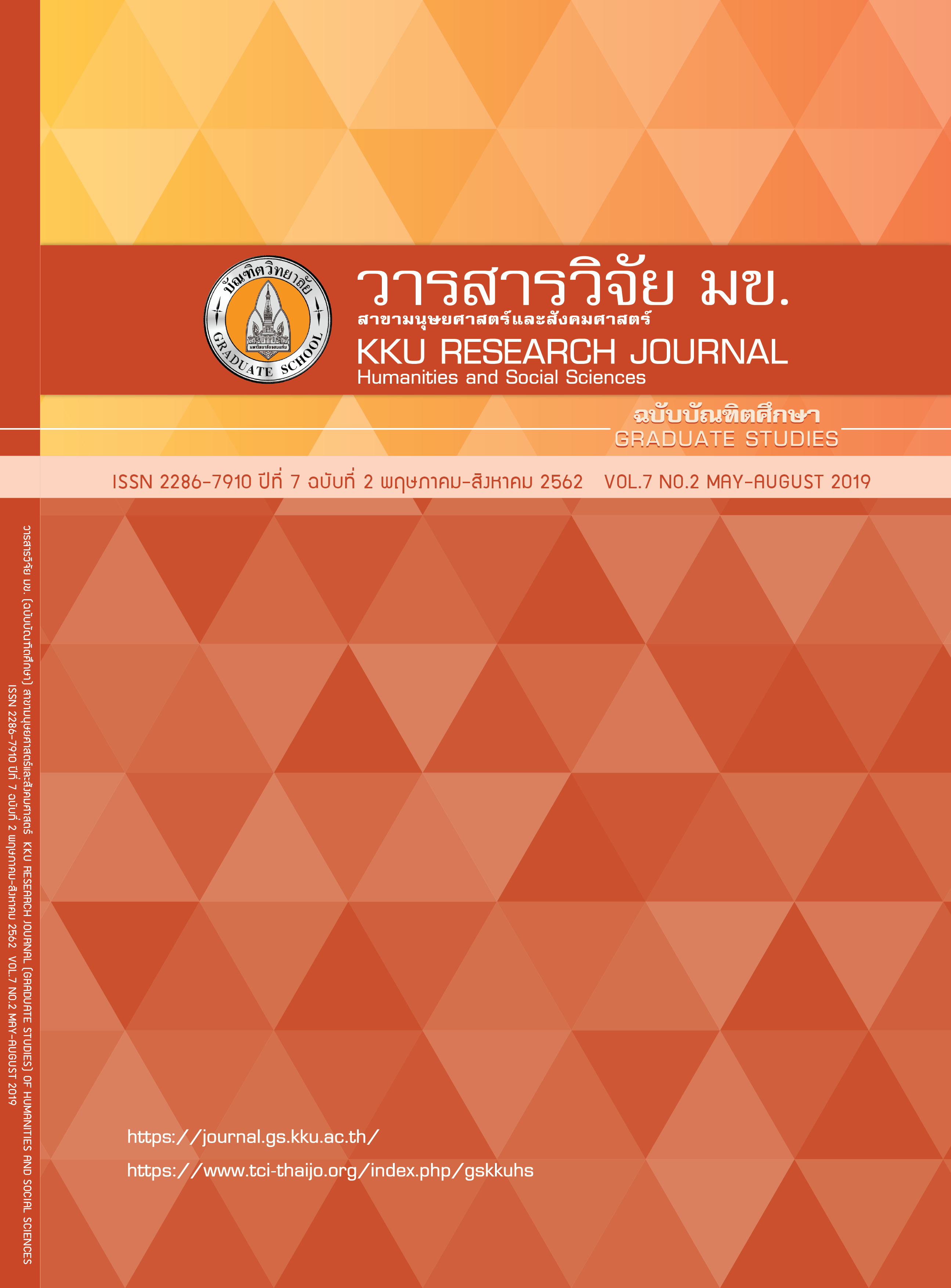การตีความหนังสือเรียนคณิตศาสตร์ของครู โดยใช้การศึกษาชั้นเรียน และวิธีการแบบเปิด
คำสำคัญ:
การตีความของครู, หนังสือเรียนคณิตศาสตร์, การศึกษาชั้นเรียนและวิธีการแบบเปิดบทคัดย่อ
การวิจัยครั้งนี้เป็นการศึกษาภายใต้บริบทการพัฒนาวิชาชีพครูโดยใช้การศึกษาชั้นเรียนและวิธีการแบบเปิด โดยมีการนำหนังสือเรียนคณิตศาสตร์ที่เน้นการแก้ปัญหาระดับชั้นประถมศึกษาปีที่ 1 มาใช้ในการวิจัย มีวัตถุประสงค์เพื่อวิเคราะห์การตีความหนังสือเรียนคณิตศาสตร์ของครูโดยใช้การศึกษาชั้นเรียนและวิธีการแบบเปิด เก็บรวบรวมข้อมูลจากทีมการศึกษาชั้นเรียนชั้นประถมศึกษาปีที่ 1 โรงเรียนคูคำพิทยาสรรพ์ จังหวัดขอนแก่น ปีการศึกษา 2560 ซึ่งเป็นโรงเรียนต้นแบบในโครงการพัฒนาวิชาชีพครูด้วยนวัตกรรมการศึกษาชั้นเรียนและวิธีการแบบเปิด ตั้งแต่ปีการศึกษา 2549 จนถึงปัจจุบัน ในหน่วยการเรียนรู้เรื่องบวกหรือลบเอ่ย โดยการวิจัยนี้เน้นการวิเคราะห์เนื้อหา ผลการวิจัยพบว่า ทีมการศึกษาชั้นเรียนวิเคราะห์โลกจริงจากสถานการณ์ปัญหาในหนังสือเรียนนั้นทำให้นักเรียนมีส่วนร่วมในการเรียนรู้อย่างมาก และนักเรียนมีเครื่องมือที่เรียนก่อนหน้ามาใช้ในการแก้ปัญหา รวมไปถึงความยุ่งยากที่ซ่อนอยู่ในหนังสือเรียนมีความสำคัญต่อการเรียนรู้ของนักเรียน อีกทั้งในการนำการศึกษาชั้นเรียนและวิธีการแบบเปิดมาใช้ในการตีความหนังสือเรียนคณิตศาสตร์ของครู ทำให้ครูได้พัฒนาตนเองในการทำงานร่วมกันเพื่อทำความเข้าใจหนังสือเรียนได้มากขึ้นกว่าการนั่งตีความเพียงคนเดียว รวมไปถึงประสบการณ์ในการใช้นวัตกรรมดังกล่าวอย่างต่อเนื่องและสม่ำเสมอ มีผลต่อการตีความหนังสือเรียนคณิตศาสตร์ที่จะช่วยให้นักเรียนได้เรียนรู้อย่างมีความหมาย
เอกสารอ้างอิง
Proceedings of CERME 6, January 28th-February 1st. Lyon France. 2009.
2. Ball DL, Feiman-Nemser S. Using Textbooks and Teachers' Guides: A Dilemma for
Beginning Teachers and Teacher Educators. Curriculum Inquiry. 1988; 18(4): 401-423.
3. Sutherland R. Teaching for Learning Mathematics. Maidenhead, England:
Open University Press. 2007.
4. Fan L, Zhu Y, Miao Z. Textbook research in mathematics education: development status
and directions. ZDM: International Journal on Mathematics Education. 2013; 45(5): 633-646.
5. Lin P, Tsai W. Improvement in Teachers’ Interpretation of Mathematics Textbooks.
Proceedings of the International Conference on Mathematics Textbook Research and Development;
2014 July 29-31; University of Southampton; 2014: 303-310.
6. Hill HC, Ball DL, Schilling SG. Unpacking pedagogical content knowledge conceptualizing
and measuring teachers’ topic-specific knowledge of students. Journal for Research in Mathematics
Education. 2008; 39(4): 372-400.
7. Didis et al. Prospective Secondary Mathematics Teachers’ Interpretations of Students’ Thinking.
In Smith, C. (Ed.). Proceedings of the British Society for Research into Learning Mathematics. 2013; 33(3).
8. Ernst von Glasersfeld. On the concept of interpretation. In Poetics. 1983; 12(2/3): 207–218.
9. Stahnke R, Schueler S, Roesken-Winter B. Teachers’ perception, interpretation, and Decision- making:
a systematic review of empirical mathematics education research. ZDM: International Journal on
Mathematics Education. 2016; 48: 1–27.
10. Hinchman KA. How Teachers Use the Textbook: Lessons from Three Secondary Classrooms.
In Dishner EK, Bean TW, Readence JE, Moore DW. Reading in the content areas: Improving
classroom instruction (3rd ed.). Dubuque, IA: Kendall/Hunt. 1992.
11. Inprasitha M. One Feature of Adaptive Lesson Study in Thailand: Designing a Learning Unit.
Journal of Science and Mathematics Education in Southeast Asia. 2011; 34(1): 47-66.
12. Inprasitha M. Processes of Problem Solving in school Mathematics. Center for Research in
Mathematics Education (CRME), Faculty of Education, Khon Kaen University: Pen printing. 2014. Thai.
13. Inprasitha M, Isoda M. Study with your friends: Mathematics for Elementary School Grade 1.
(Thai Edition). Khon Kaen, Thailand: Kangnana Wittaya Printer. 2011. Thai.
14. Takahashi A. Recent Trends in Japanese Mathematics Textbooks for Elementary Grades:
Supporting Teachers to Teach Mathematics through Problem Solving. Universal Journal of
Educational Research. 2016; 4(2): 313-319.
15. Inprasitha M. Lesson Study and Open Approach to improve Quality of Classroom and
“Kyozaikenkyu” in Lesson Study and Open Approach. Handout of Workshop for Educational
Personnel. 2017 June 4-6; Anubandumrongrachanuson School, Sisaket, Thailand. 2017. Thai.
16. Stigler JW, Hiebert J. The Teaching Gap: Best Ideas from the World’s Teachers for Improving
Education in the Classroom. New York: The Free Press. 1999.




